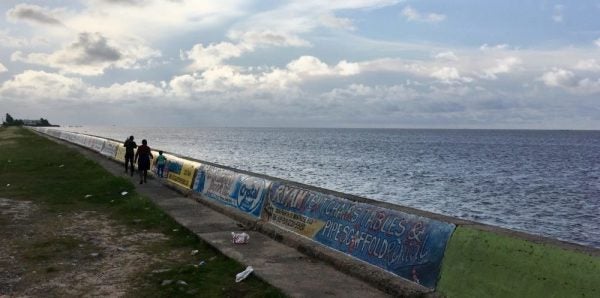Guyana’s Rampant Violence Reminds Me Of My Childhood In Sri Lanka. That’s A Bad Sign
I’m in a rickety yellow cab when another one comes screaming out of a side lane and screeches into the...

I’m in a rickety yellow cab when another one comes screaming out of a side lane and screeches into the traffic headed in the opposite direction. A security guard comes running after this second cab, shooting at it wildly. I duck.
Welcome to Georgetown, capital of Guyana. It was my third week here.
A few days later, in another taxi, I hear gunshots. Traffic halts. I stay put, telling myself this is less dangerous than Afghanistan, where I worked for four years. The traffic starts to inch forward. We reach the cross street and see a dead man, killed while attempting to rob someone, being loaded onto the back of a truck.
When the U.S. State Department posted my husband to Guyana, we knew that it was a country considered “critical for crime” in State Department parlance. We live in a house behind an eight-foot-high wall, topped by concertina wire, and with round-the-clock security guards. We were advised on no-go neighborhoods and received instructions on precautions while driving. We were told about the dangers of carrying valuables. We made adjustments. Walking or even running outdoors is challenging. The Sea Wall — literally the wall that keeps the ocean from charging into this land that lies about three-feet below sea-level — is one of the few accessible places for exercise and an evening walk. But there have been several muggings there, which does not make for an appetizing outing at dusk.
In the past year, there have been more than half a dozen incidents involving foreigners. These range from armed robbery to burglaries. In one recent incident, a group of Americans was robbed at gunpoint as their van made its way through the capital’s afternoon traffic. A gunman reached into their vehicle as the van slowed down for traffic and threatened the group, then made off with their money and passports.
Average Guyanese have it worse. Local media carries an average of two stories each day that include armed robberies, domestic violence, and murder. The most recent publicly available figures indicate that Guyana has experienced a 47% increase in robberies between 2016 and 2017.
Guyana is an outlier. It feels like a country emerging from a long conflict, and yet it hasn’t experienced conflict like Afghanistan, the Congo or even countries like Sri Lanka. The extreme contrast between the wealthy and poor is tangible. At the city’s two posh hotels, women are often wearing jewels, layers of professionally applied make-up and carry designer handbags. A few miles away, others are barely surviving.
With the passage of time, I am becoming more inured to the violence. I tell myself that Guyana is a country like many others with a slew of man-made problems, to include the ruling triumvirate of poor governance, endemic corruption, and a grasping ruling class.
Growing up in Sri Lanka amidst a decades-long civil war, violence was a part of my daily existence. Back then, I assumed that insecurity was limited to countries experiencing outright conflict or disasters. Guyana has made me think differently. Few countries can remain perpetually immune to the combined effects of poor governance, corruption and the vast and growing gap between the wealthy and poor. At some point, they either descend into conflict or become places of perpetual insecurity.
Dilshika Jayamaha is a stabilization and security-sector reform specialist. She was educated in Sri Lanka and the United States. She worked on stabilization, political and security transition during a four-year assignment in Afghanistan. She currently works as a military training advisor and is a consultant on several projects focusing on stabilization and preventing and countering violent extremism.
